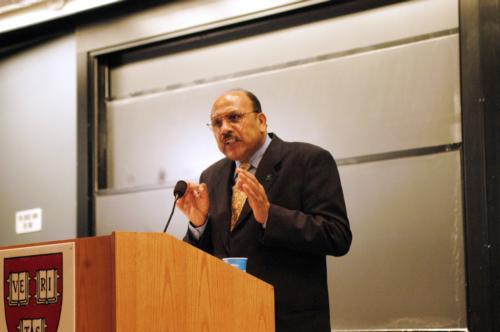
News
When Professors Speak Out, Some Students Stay Quiet. Can Harvard Keep Everyone Talking?

News
Allston Residents, Elected Officials Ask for More Benefits from Harvard’s 10-Year Plan

News
Nobel Laureate Claudia Goldin Warns of Federal Data Misuse at IOP Forum

News
Woman Rescued from Freezing Charles River, Transported to Hospital with Serious Injuries

News
Harvard Researchers Develop New Technology to Map Neural Connections
Oil CEO Predicts Energy Use Rise

The chief of the world’s largest oil company predicted an increasing dependence on fossil fuels despite the emergence of alternative energy sources in a talk yesterday sponsored by the Harvard University Center for the Environment.
At the standing-room only event, Abdallah S. Jum’ah, the president and CEO of oil producer Saudi Aramco, attributed this growing demand for oil to the rising global population and better living standards in the developing world. “Over the next several decades, we must substantially increase the amount of energy available to consumers around the world,” he said. “By 2030, total energy consumption will be 70 percent higher than today’s level.”
Jum’ah said yesterday’s speech marked the first time he had returned to Harvard since 1976, when he attended the Business School’s Program for Management Development.
“We want to build more contact with Harvard,” he said after the talk.
In his speech, Jum’ah emphasized the need for increased oil exploration to meet consumer demand, saying that Saudi Arabia is “under-explored” and its fields are “prolific.” He called the attempt to balance this demand for energy with the need to protect the environment “one of the most significant challenges.”
Saudi Aramco is currently working to decrease carbon dioxide emissions and limit the amount of energy required to produce a barrel of oil, he said.
Despite being a self-proclaimed “oil man,” Jum’ah conceded the importance of developing alternative energy sources such as ethanol and hydrogen fuel cells. “It is a process that will take time...not a transformation that can be rushed,” he said.
Jum’ah said after the speech that Saudi Aramco will “let others” invest in alternatives because the company’s bylaws mandate that its main focus be hydrocarbons. The company is owned by the Saudi government.
When asked by an audience member about restricting oil production to curb global warming, Jum’ah asserted that this would be disastrous. “Restricting production means people who need energy are not going to get it,” he said. Instead, Jum’ah said, efforts should be focused on making oil production “cleaner and more user friendly.”
His answer prompted another audience member to shout out, “People need energy, not oil!”
The CEO said, “Excuse me,” before continuing.
Audience members noted Jum’ah’s certainty of the continued dominance of oil.
“He was a little bit too willing to assert estimates favorable to his industry,” Mitchell C. Hunter ’09 said.
Chris D. Holmes, a graduate student in Earth and Planet Sciences, echoed the point.
“I was surprised by his confidence in the oil industry to remain unperturbed with possible new technologies,” he said.
—Staff writer Shoshana S. Tell can be reached at stell@fas.harvard.edu.
Want to keep up with breaking news? Subscribe to our email newsletter.
